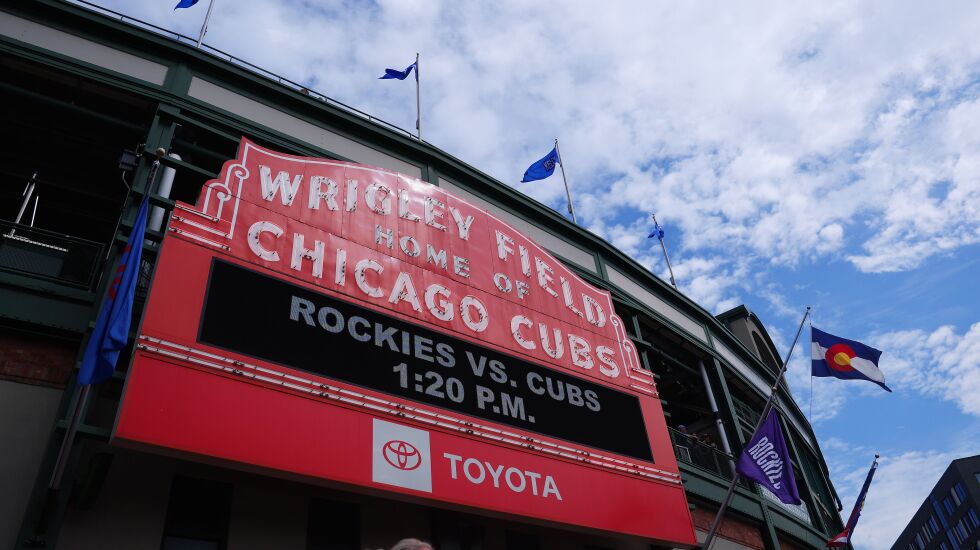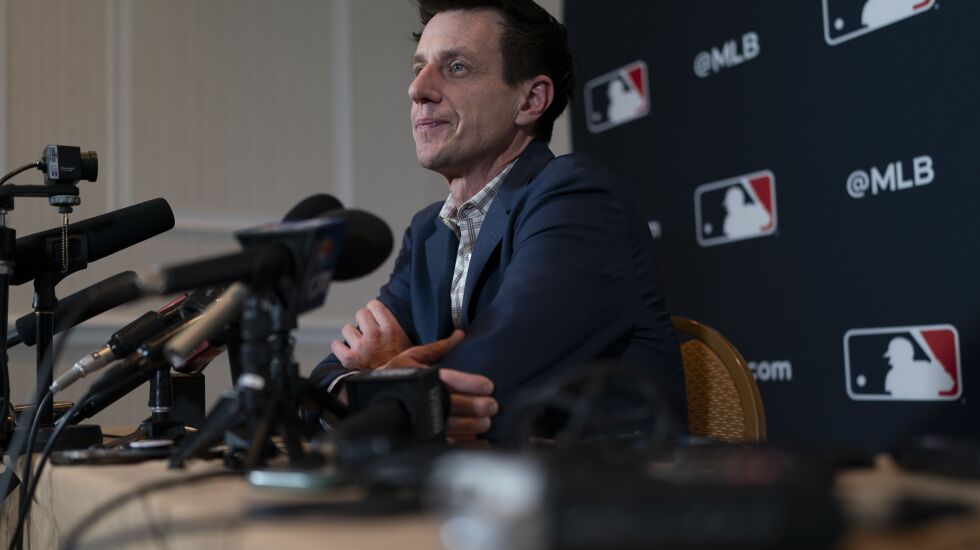
Meghan Jones had always been drawn to the idea of a career in sports. She was a multi-sport athlete growing up and gravitated towards a team environment.
“I just didn’t know how to get there necessarily, if you weren’t a coach or a player or a GM,” she said. “And so not not knowing the direct path to a front office, I started working in business.”
Two years into her digital marketing and operations job with Discover Financial Services, a stroke of luck opened a path.
She’d inadvertently made a thin and winding connection to the Cubs between graduating and starting her first job. She took up babysitting for a month, and stayed in contact with the family she worked for, a family that knows former Cubs president of baseball operations Theo Epstein through their sons.
So, when Epstein started looking for a new executive assistant in 2016, the family mentioned Jones.
The connection proved fortunate for the Cubs, too. Jones climbed through the ranks, winning the Ron Santo Award in 2021, earning her master of business administration from Northwestern University, helping spearhead diversity and inclusion programs. This offseason, the Cubs promoted her to vice president of baseball strategy, making her the first woman VP in Cubs baseball operations.
“She’s the No. 1 draft pick in the office,” said Jared Banner, who was recently promoted to assistant general manager. “She’s the person that we need the most — my apologies to [president of baseball operations Jed Hoyer] and [general manager Carter Hawkins] on that. But she does so much for us as a group, mainly in filling our blind spots in terms of process, hiring, culture — anything you can name she’s an aficionado in.”
Jones just first needed to find a way into the closed-off world of Major League Baseball.
Both the Cubs and MLB as a whole have been trying in recent years to open that door for more people. Epstein, while voicing his support of the Black Lives Matter movement in 2020, took a critical look at his own hiring practices and called on the rest of MLB to do the same.
A year later, then-White Sox executive vice president Ken Williams spoke at the GM Meetings about a frustrating lack of diversity in baseball operations leadership.
And MLB made changes to the Selig Rule — which requires teams to consider minorities while filling vacancies for manager and key front office roles — centered around internal promotions and aimed at avoiding “token interviews.” For women and people of color in baseball, feeling during an interview as if a team was simply trying to fill quota had become an all too common experience.
The Selig Rule still isn’t perfect. The Cubs raised eyebrows last month when they hired Craig Counsell as manager and ousted David Ross in one fell swoop, without opening a vacancy. But they were in compliance with the rule, which requires clubs to receive approval from MLB after fully describing their interview process candidates considered.
There may not be a perfect solution.

“But if there’s a commitment and a spirit behind something that everyone agrees should be done, then action should take place,” Williams said after the 2021 GM meetings. “You should see results.”
Recent progress has been incremental and stalled at the top of baseball operations. Al Avila was the only Latino general manager in MLB for years, before the Tigers fired him midway through the 2022 season. Dana Brown became the only Black GM in MLB when the Astros promoted him in January. Farhan Zaidi is now the only Asian head of baseball operations, after general manager Kim Ng declined her mutual 2024 contract option with the Marlins in October.
Ng reportedly made the decision after learning the organization planned to hire a president of baseball operations over her, even after she built a playoff team. She was the first female GM in MLB.
Even one level deeper, the results are mixed. The Institute for Diversity and Ethics in Sports’ (TIDES) most recent report found that as of Jan. 1 2022, people of color represented 16.1% of team vice presidents, an increase from 15.3% the year before. The percentage of women in those positions dropped from 22% in 2021 to 18.3%. In its 2022 report card, TIDES gave MLB a C- in racial hiring and F in gender hiring for vice presidents.
“It’s certainly valuable to have diversity in the executive ranks, but I also think the way you develop a great, diverse pipeline is by really focusing on that throughout,” Hoyer said in October 2021.
He had just introduced Hawkins as his new GM. After renewing a commitment to diverse hiring practices, he chose a white man who graduated from Vanderbilt University. But the point of emphasizing diversity and inclusion isn’t to mandate the hiring of women and people of color. That would only give teeth to the myth of the “diversity hire” — an insult overqualified people from underrepresented groups constantly battle.
By all accounts, Hawkins, who built a strong reputation as he rose through the ranks in Cleveland, has been a great hire.
“I will say this: when you look at our front office over time, I think it’s going to be incredibly diverse,” Hoyer said at Hawkins’ introductory news conference. “Certainly the applicant pool was. And every process will continue to be. And I think we’ve really made great strides in that area.”
The point of emphasizing diversity and inclusion is rethinking the processes that have locked baseball into a predictable loop. Many baseball executives have similar backgrounds to Hoyer and Hawkins. And when hiring managers stick to familiar networks to find candidates, a self-perpetuating cycle develops. Expanding the hiring pool makes for a better chance at finding the best candidate for the job.
As Williams put it: “We have to work hard to understand that no one here is talking about bringing in people that aren’t qualified for the job. Just the opposite. Just giving people an opportunity who are qualified.”
Soon after Hawkins joined the Cubs, the team announced the hiring of Ehsan Bokhari as an assistant general manager. Bokhari, who is half Pakistani and half white, was considered a rising star for his work with the Dodgers and Astros’ research and development departments.
A year earlier, Banner came on as the Cubs vice president of special projects, making franchise history as the club’s highest-ranking Black baseball operations executive. Banner, who played baseball for Amherst College, ascended from Red Sox baseball operations fellow to Mets executive director of player development before landing in Chicago.
Now, Hoyer, Hawkins, Bokhari and Banner make up the core leadership group at the head of baseball operations. And there will be more shifting in the front office. The Cubs have to fill the hole at farm director left by Banner’s promotion — although he said he’ll remain involved in player development. And Jones will build out a baseball strategy department.
“We have a really good mix of people, good diversity in backgrounds and skill sets,” Jones said of the baseball operations leadership group. “And I’m really excited about being able to work even closer with a lot of my co-workers that I deeply respect and admire.”
Jones and Banner worked closely together when Banner took over as head of player development ahead of the 2022 season. The director of minor-league operations wasn’t in place yet, so Jones stepped in to support the transition. And they’ve become good friends.
“He has been incredibly inclusive of me, bringing me into a number of conversations and rooms that I may have not otherwise necessarily been a part of, in order to help intentionally develop me,” Jones said. “And so for that I will always be grateful.”
Sometimes promoting diversity and inclusion comes in the form of hiring practices or programming. Jones, for example, co-founded the CASE (Careers as Sports Executives) Study Program and was a member of the inaugural Cubs Diversity, Equity, and Inclusion Council from 2020 to 2022. MLB has spearheaded similar initiatives.
Sometimes it’s more subtle than that, holding a door open for the next person and encouraging them to walk through.







